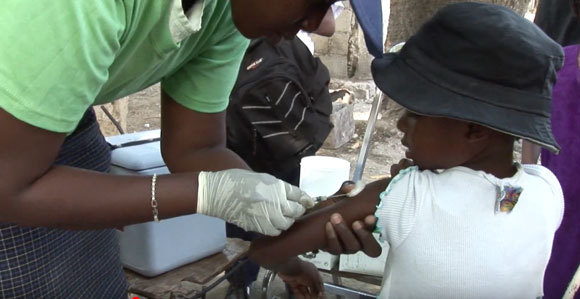
3rd October 2016 Measles has officially been eradicated from the Americas The Region of the Americas is the first in the world to have officially eliminated measles, a viral disease that can cause severe health problems including pneumonia, brain swelling and even death. This achievement culminates a 22-year effort involving mass vaccination against measles, mumps and rubella throughout the Americas.
The declaration of measles' elimination was made by the International Expert Committee for Documenting and Verifying Measles, Rubella, and Congenital Rubella Syndrome Elimination in the Americas. The announcement came during the 55th Directing Council of the Pan American Health Organisation/World Health Organisation (PAHO/WHO), attended by ministers of health from throughout the region. Measles is the fifth vaccine-preventable disease to be eliminated from the Americas, after the regional eradication of smallpox in 1971, polio in 1994, and rubella and congenital rubella syndrome in 2015. "This is a historic day for our region and indeed the world," said Carissa Etienne, PAHO/WHO Director. "It is proof of the remarkable success that can be achieved when countries work together in solidarity towards a common goal. It is the result of a commitment made more than two decades ago, in 1994, when the countries of the Americas pledged to end measles circulation by the turn of the 21st century." Before mass vaccination was initiated in 1980, measles caused nearly 2.6 million annual deaths worldwide. In the Americas, 101,800 deaths were attributed to the disease between 1971 and 1979. A cost-effectiveness study on measles elimination in Latin America and the Caribbean has estimated that with vaccination, 3.2 million measles cases will have been prevented in the region and 16,000 deaths between 2000 and 2020. "This historic milestone would never have been possible without the strong political commitment of our Member States in ensuring that all children have access to life-saving vaccines," Etienne continued. "It would not have been possible without the generosity and commitment of health workers and volunteers who have worked so hard to take the benefits of vaccines to all people – including those in vulnerable and hard-to-reach communities."
Measles transmission had been considered interrupted in the region since 2002, when the last endemic case was reported in Venezuela. However, as it continued to circulate in other parts of the world, some countries in the Americas experienced imported cases, with over 5,000 reported infections between 2003 and 2014. The Expert Committee reviewed evidence presented by all the countries of the region between 2015 and August 2016 and decided that it met the established criteria for elimination. This process included six years of work with countries to document evidence of the elimination. As a result of worldwide measles elimination efforts, only 245,000 measles cases were reported globally in 2015, a substantial decline from earlier years. More than a half of these reported cases were in Africa and Asia. To maintain measles elimination, the Expert Committee have recommended that all countries of the Americas strengthen active surveillance and maintain their populations' immunity through routine vaccination. "I would like to emphasise that our work on this front is not yet done," warned Etienne. "We cannot become complacent with this achievement but must rather protect it carefully. Measles still circulates widely in other parts of the world, and so we must be prepared to respond to imported cases. It is critical that we continue to maintain high vaccination coverage rates, and it is crucial that any suspected measles cases be immediately reported to the authorities for rapid follow-up." Under the WHO's Global Vaccine Action Plan, measles will be wiped out by 2020 everywhere except Southeast Asia. Humanity is clearly winning the fight against this particular virus. ---
Comments »
|







